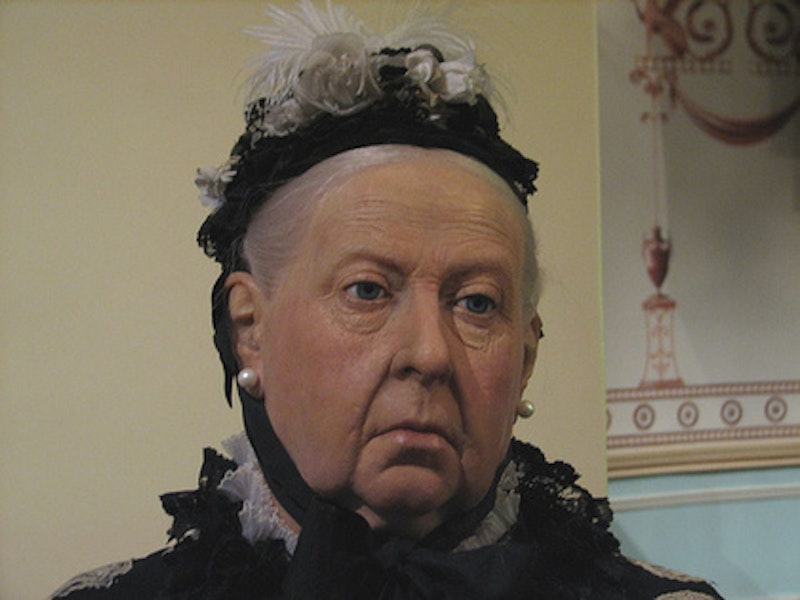LONDON - "The king is dead. Long live the king." There are few finer phrases in the English language. Within those eight simple words, a legacy can end, begin, or continue. Within those eight simple words, decades of rule are completely wiped out, replaced by a fresh face or maybe even a familiar one. Within those eight simple words, life continues because it must, and there is little time to look back when the present is at hand.
Grieving is an odd, difficult process. In some, it forces a sense of self-reflection; in others, it produces complete self-denial. You have to ask yourself scary questions about whether you care too much or not enough. Grieving isn't only about a relative passing away, you can grieve over anything: your lost camera, your favorite canceled TV show, Jeffrey Maier catching that fucking ball. Yet losing a person—whether to break up, distance, or death—leaves the biggest gap. By nature, humans are social creatures, and the pieces of our social fabric are irreplaceable. If you lose a puzzle piece, the puzzle will never quite be complete again, even if you find a nearly identical piece.
A king is more than a person. A king personifies an era of time. Victorian homes were built during the reign of Queen Victoria. Shakespeare wrote during Elizabethan times. A king's death is a marker of time. I have no idea what it would be like to feel despair over the loss of a ruler, and no one does really, because the importance of dynastic rule has faded in western society. True, our time is marked by presidencies, decades, disasters, triumphs, but these aren't clear-cut separators of time. The death of a king is that sweet little divider thing in the supermarket checkout aisle: this is one set of groceries, and this is a different set.
Right now, this column is being written in a friend of a friend's London flat on Baker Street, the street famous as Sherlock Holmes' address. Sitting here seven years ago, it would have been different. The dollar and pound would be similar enough that I wouldn't bitch every time I have to buy something. Anti-Bush memorabilia wouldn't line the stalls of Camden Town market. I would be the happy-go-lucky spoiled American, rather than a symbol of a flailing economy and a despised regime.
Yesterday, I went to look up the history of my last name in Amsterdam, its origin point. While sifting through the records, the assisting clerk had me to write down a call number for a piece of microfiche. The number was "R3-911." When we got to the microfiche files, she asked me to give her the number I'd taken down. She repeated each word after me. "R? Then three, right?" she asked. "And then 911, like the... you know... oh."
My lifetime has really only seen one change in era, and it was 9/11. I remember hearing about how 9/11 would be the birth of a new America. We were living in a post-9/11 world. After a short period of intense patriotism, the same old squabbles emerged between Democrats and Republicans. It seemed that nothing had changed. But everything really had changed.
The way other countries think about us, the way we think about them, the way we think about ourselves: these are not the same. The lexicon has changed. We are not the world's only superpower anymore, and that moniker was slowly phased out. Our concerns with global standing, the war on terror, gas prices, and our reliance on allies have all emerged as defining concepts for our generation. We are fighting a war that few support. The dollar is becoming worthless, and the Euro is creeping up as a rival currency. We might elect a black president. This is the culture that has emerged post-9/11. As the great poet Christopher Wallace once said, "Damn, shit done changed."
Nevertheless, my life didn't really change. It isn't as though these things are absent from my life, but they don't define them. Sure, I drive less and I read about the Middle East more often in the newspaper, but those are little things. One of my best friends just got home from fighting in Afghanistan, and I'm sure this era-change has been much more profound for him.
The first real change in my life is about to happen. An era is actually going to end for me. Over a beer in Paris, a friend was talking about how the approaching conclusion of the trip was making him nervous. He said something that I brushed off at the time but is uncomfortably true: "This is the end of our childhoods." He's right. I'm going to get on a plane at Heathrow and when I get off, I will not be a kid anymore. I will be expected to find a job, support myself, and be independent. My home will no longer be my parents’ home—I hope. No more summer breaks. When someone asks what I do, I can't say "student" like I have since I was able to speak. Everyone says college is a big adjustment, but it isn't really. You just go to school somewhere else. Sure it's more independence, but it isn't pure isolation for most people. I'm about to be a real person. This is the first real change in my life.
Jesus, getting off a plane at JFK in New York will be a more significant moment in my life than two planes crashing into the World Trade Center in the same city. I don't know how we reconcile that level of self-absorption with our social dependency. We are such social creatures, and the loss of one person means so much, yet the loss of many never feels quite the same. We care about ourselves
Curiosity Kills Me
The Eurotrip comes to an end, and life as an adult sneaks ever closer.

Queen Victoria, as rendered at Madame Toussaud's in London. Photo by DanieVDM
